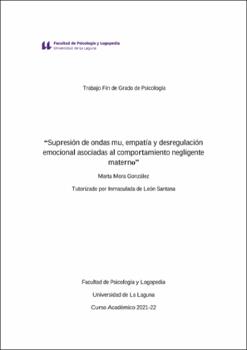Supresión de ondas mu, empatía y desregulación emocional asociadas al comportamiento negligente materno
Autor
Mora González, MartaFecha
2022Resumen
Se analizan las oscilaciones de la banda del ritmo mu durante el visionado de
expresiones faciales infantiles de llanto, alegría y neutro en dos grupos de madres: uno
control (GC) y otro con comportamiento negligente (GCN). El objetivo principal es
detectar posibles diferencias de supresión ante los diferentes estímulos emocionales. La
supresión de mu se ha asociado a variables psicológicas como la empatía y habilidades
sociales superiores (Hasegawa et al., 2016). Debido a esto, se indaga cómo afecta a su
comportamiento la empatía y la desregulación emocional medidas a partir de dos
cuestionarios: IRI Interpersonal Reactivity Index y DERS-S SF Difficulties in Emotion
Regulation Scale. Igualmente se prueban las diferencias entre las madres en estas dos
variables y la relación entre ellas. Los resultados explicitan diferencias de procesamiento
emocional intergrupo: menor supresión mu en GCN para los estímulos de llanto y alegría.
También se observan diferencias entre los grupos en la desregulación emocional, mientras
que no en empatía. La contribución del estudio es significativa puesto que pone de
manifiesto diferencias en aspectos psicológicos, así como una menor desincronización
ante caras infantiles emocionales entre las madres, lo que puede explicar el inadecuado
contacto madre - hijo. We analyzed the oscillations of the mu rhythm band during the viewing of infant
facial expressions of crying, joy and neutral in two groups of mothers: one control (CG)
and the other with neglectful behavior (NCB). The main objective is to detect possible
differences in suppression to different emotional stimuli. Mu suppression has been
associated with psychological variables such as empathy and superior social skills
(Hasegawa et al., 2016). Because of this, we investigate how empathy and emotional
dysregulation measured from two questionnaires: IRI Interpersonal Reactivity Index and
DERS-S SF Difficulties in Emotion Regulation Scale affect their behavior. Differences
between mothers in these two variables and the relationship between them are also tested.
The results show intergroup differences in emotional processing: lower mu suppression
in GCN for crying and joy stimuli. Differences between groups are also observed in
emotional dysregulation, but not in empathy. The contribution of the study is significant
since it shows differences in psychological aspects, as well as a lower desynchronization
to emotional infant faces among mothers, which may explain the inadequate mother -
child contact.





